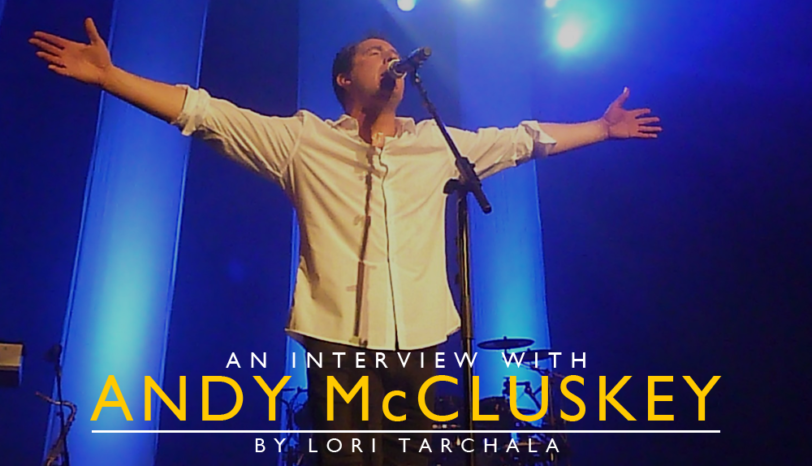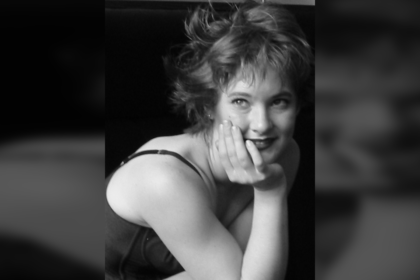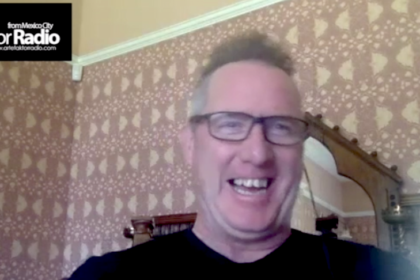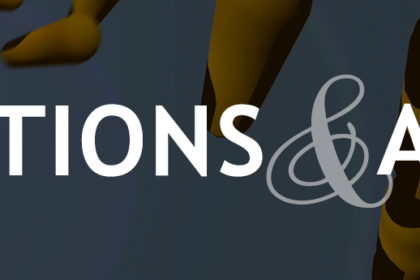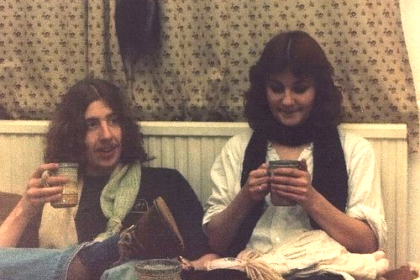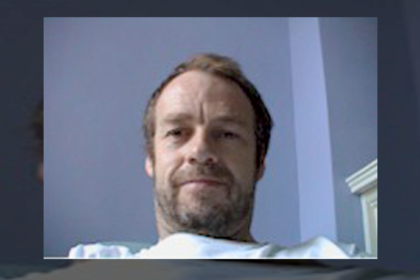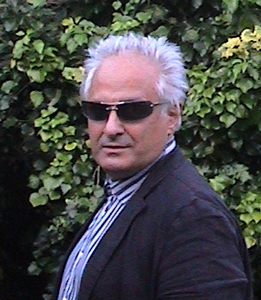Orchestral Manoeuvres in the Dark’s founding members Andy McCluskey and Paul Humphreys have been making music together since the mid ’70s.
They were eventually enlarged to a quartet when Malcolm Holmes and Martin Cooper joined the team and together they broke the musical airwaves with their own unique blend of synth music that married the infectiously fun pop with the melancholy sounds of choirs and strings.
Upbeat hits like ‘Electricity’ and ‘Enola Gay’ were matched with equally enduring, moving singles like ‘Joan Of Arc’ and ‘Maid Of Orleans’ to help cement OMD’s place in the UK and European charts. But it wasn’t until the mid ’80s that the American public really started to take notice.
When John Hughes’ movie of Pretty In Pink came out with OMD song ‘If You Leave’ as its single, you couldn’t go anywhere without hearing it. But American success meant more pressures and eventually the band got to a point of calling it quits. Andy McCluskey continued on, releasing three more albums under the OMD name while the other three remaining members formed The Listening Pool. By the mid ’90s synthpop music wasn’t seen as “cool” anymore so Andy McCluskey turned to writing and working with girl band Atomic Kitten (and later with The Genie Queen).
Fast forward to 2005 and the band agreed to do a German TV gig. It would be the first time in over a decade that they would be on stage performing together but it went so well, and the music scene was once again changing, this time to their favor, that they agreed to give a short tour a try. That tour sold out quickly and was followed by more gigs over a 3 year period.
But being true musicians, OMD weren’t going to just stop at touring and in 2010, fans were given the prize of a stellar new album called History Of Modern. Keeping to the OMD sound, yet updated for the times, it was met with great reviews, even from American Press… Spin Magazine giving it a 7 of 10. A world tour saw the guys finally hitting the American shores in March to a triumphantly sold out crowd everywhere they went!
I had the massive honor of sitting down with Andy McCluskey in Miami a couple days before the start of their North American Tour Part 2 to discuss the tours, then and now, among other things…
Compared to the March tour to now, where do you feel, I mean where’s your mind? Are there the same concerns that you had in March that you have now or the same expectations?
We have concerns, but they’re different. I think possibly we shouldn’t have taken the offer to come back. I don’t think we’re going to sell out as many of the places. I think maybe it was too soon to come back but we were just so excited after the success of the March tour and the feedback was SO positive and the audiences were SO good. And we had a whole line of promoters who didn’t take us in March going “Oh, oh, yeah can we have them now please? Now that they’re selling out and everybody loves them”. So we’ll see, but I think there’s going to be a couple of real stinkers… but then again what we’re doing here is we’re mopping up the secondary markets and there’s a reason obviously why we didn’t come to some of these places first time out is that they’re just really not going to be big ticket sales.
And also, I mean we only ever played one gig in Florida before in our lives for example and that was supporting Thompson Twins way back in the mid ’80s so, you know, there isn’t even a history of having a live audience. However, whoever turns up, I’m sure they will be great and we will give them the best concert we can. So yeah, my only other concern is just these 3/4 in a row. We survived last time, just gotta take it easy. I mean the other reason is Malcolm and I are here early is because we found the first week we were just so tired from jetlag. I mean Friday night.. had we come in today with everybody else, Friday night at 10 o’clock it would be like going on stage at 3 o’clock in the morning for us so we had to try and get over the jetlag a bit but we’re looking forward to it.
Well in terms of what you had with the booking agents and everything from the first tour to now, you said that you had a lot of people popping up after the sell-outs. Is there a different layout from what you did before? Like I know Bright Antenna kind of split the bill for the first one. Were they the ones that were promoting you and now you have a promoter or booking agent?
No, Bright Antenna were literally just offering to cover the shortfall if there was one. In the end, because of the VIP thing, I think it worked out that the shortfall wasn’t that bad. And we used the money from the summer festivals to offset what we did lose in America, which ended up not being that much. The VIP tickets thing really helps actually. That’s a nice way to earn extra money and everyone seems to love it. It’s an opportunity to actually physically meet people and to see a sound check and get a little bit of an idea of behind the scenes. So, you know, we’ll have to see, but we will lose money. As long as we don’t lose like $100,000 or something.
Which was what your last tour was.. the risk right?
Yeah, yeah, I’m not going to tell you exactly what we’re going to lose. Considerably less then the POTENTIAL projection. (laughs)
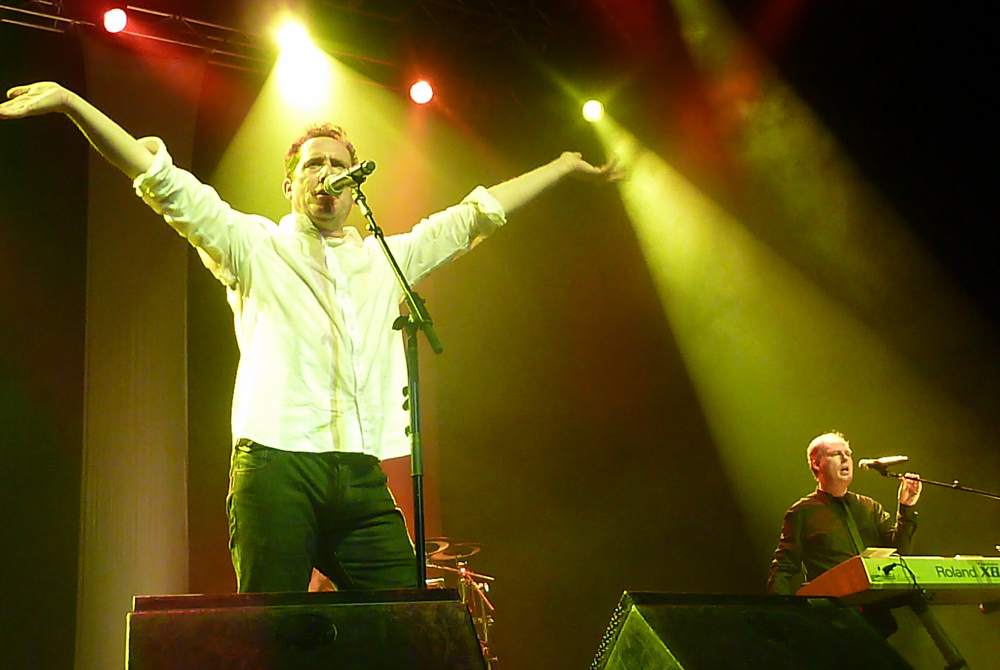
So what’s your favorite and your least favorite thing about touring?
My favourite part of the tour is actually the gig and the crowd. Because the concerts these day, without jinxing us, are so consistently good. And I mean the American audiences in March were just incredible. I don’t think we really knew what to expect.
Yeah, you could tell by the looks on your faces
They were fantastic crowds and some of them were ABSOLUTELY unbelievable. So yeah, how can you not bathe in the fabulous soaking up of all that love you get on stage? (laughs)
So I would say that would be the most positive… I mean I like seeing places. The dilemma is that these American tours are so tight, so cut to the bone that there’s very little time to see anything.
Unless you do something like this where you come in early. Are you going to stay a little bit later when you guys get done? You finish in Mexico…
Yeah, I’m going to stay in Mexico for a couple of days and see if I can go do Aztec Pyramids for a few days.
Be careful! Cause that’s the reason I’m not going, everyone kept saying it’s so dangerous and…
Yeah, but I think that’s more kind of along the borders where you’ve got the drug wars and things. Eh, maybe I’ll just be locked in my hotel room for two days wishing I’d gone home early. And the down side I think it’s just the tiredness. Malcolm and I were SO tired on that American tour. But you know, we hadn’t slept on buses before. We hadn’t flown in and taken on a tour where we were jet lagged like the day after we landed kind of thing so, that’s why we’re here a bit earlier. But that’s not really a big downside… I just worry, as a singer, I’m always worried about my voice. So I can’t party, which is not a bad thing at my age. I can’t party, I can’t stay up late. I literally, I get on the bus, have a jack and coke, a sleeping pill, jump in my bunk with my iPad and pass out and that’s it. No staying up late, no rowdy late nights, just bed. Really boring (laughs)
If that’s what it takes (laughs)
(laughs) But that’s what it takes. You know you’ve got to prioritise. I need 90 minutes of energy on stage and the rest of the time I’m just a vegetable. (laughs)
We were talking about the reviews of your shows, how do you think the American press treats you guys like now versus in the ’80s? Because you got a lot of good reviews from the tour which was encouraging but are they nicer to you this time around for a lack of a better way of saying it?
The general press attitude towards us is generally more positive than it used to be. I mean we do seem to be seen as this sort of, you know, iconic influential group that has stood the test of time now which is considerably more positive than some of the things we used to get. So that’s part of it but I think also aligned with that is the fact that so many of the American reviews were written by people who had either seen us 25 years ago or never seen us and didn’t know what to expect and this pleasant surprise and shock that like “Holy shit, they kick ass on stage!”. (laughs)
It’s not just a bunch of old men going through the motions. And I think that generally was really nice to see. Just every single review was like “Oh my God, they’re so full of energy, the songs are great, they play them just like the record, there’s such a huge interaction between the band and the audience”. So yeah I would probably say that the general press view of us is more positive than ever before really.
That’s cool!
Yeah, I mean, when we first came over to the States, there was a real attitude cause a lot of the press was very kind of traditional rock press in America. And their attitude was that “Oh it’s you know, faggot synth music we’re gonna be glued to now”……and not real rock and roll. There was a lot of resistance.
Well even when I was growing up, we had to go to import stores to find you guys. I mean you were pretty much considered “underground” or “college” radio and I was young, I was 11 years old when I heard you so I didn’t have that ability. But was it frustrating for you guys to come over here and be seen like that? I mean in the ’80s over in Europe and UK, you had Architecture and Morality, had all those hits and stuff so you guys were playing a lot bigger…
Yeah, it was very frustrating! It was very frustrating to be selling out big theatres in Europe, having hits and then coming over here and being in little shitty clubs and having to start all over again. It was very frustrating. We weren’t helped by the fact that Virgin gave our license away in sort of block booking: “Here take XTC, Japan and OMD and see what you can do”. And the first label we were on over here, were just hopeless. Their idea of releasing an OMD record was hide it under the carpet. We were totally wasting our time. Basically it wasn’t until we got on A&M with the Junk Culture album that things started to improve. It just felt like we kind of wasted all those first four albums. But there’s people who were literally finding us on college radio or going to import stores and it was nice to see that when we came back here, there were people who remembered the early stuff, not just Crush and Pacific Age.
Yeah, I had a friend who was like “Oh, ‘Enola Gay'” and I was like “REALLY? you know ‘Enola Gay’?” (laughs) It’s like how’d that happen? What about airplay? Cause you have Bright Antenna now, are they a subsidiary of 100%?
No no, they’re a small label out of the bay area.

OK, so is anything going to be played?
No, they’re not going to get it. You see, they’re a small label, they don’t have a big budget for like radio pluggers and things like that. And radio’s not going to play us. We have this problem in Europe as well though…you know, apart from BBC Radio 2, we don’t get radio play. Cause what tends to happen is you take a new song into a station and the Top 40 stations are like “Well we don’t play it, they’re too old for our demographic” and then the other stations that play more broad or retro stuff or older music go “Yeah OMD, yeah we love that stuff.. let’s play ‘Maid Of Orleans’ instead” (laughs) “Play the new one” …. no no, our listeners like the old stuff”. So you’re just falling down a hole.
Damned if you do, damned if you don’t.
It just doesn’t happen. We just have to accept that. I mean, when we made History Of Modern, we knew we were not going to get the sales, we knew we weren’t going to get the radio play. We weren’t making it because it was a career move in terms of thinking we were going to get a radio hit or it charted. And that’s not how we judged it and I found it quite surprising that some people on the forum were like “Well it hasn’t charted very well or it hasn’t done this” and it’s like, well, you know…we weren’t expecting it to. I mean the fact that it sold about 130,000 copies worldwide… for ME is like 4 times what I thought it would sell.
Well and especially the way the market is now….I mean, growing up we had CDs and you would go to the store and buy something. Now people digital download. I don’t even pay attention to what’s on the top of the charts.
No, I don’t even know what’s in the charts these days. We accepted that we weren’t going to get radio play. It’s frustrating because I think something like ‘History of Modern (Part I)’ or ‘Sister Marie Says’ …well you see how they go down live. People just treat them like they were hit singles. I think that had we HAD support, you know, a lot more people would have heard the songs and got into the band. We just have to accept that it is what it is.
What about ‘New Babies: New Toys’? Cause I know that was used on America’s Got Talent. Is anything happening?… I mean are you guys really going to release it? I know you made a video and….
Well it’s been available as a download single but we just have to realize that we’re going to be largely flying under the radar. We just hope that it’ll grow a little bit. We’re starting also, almost from scratch again because the band stopped, you know? It’s not like the Pet Shop Boys or Depeche Mode who carried on and retained a residual live audience and sort of fanbase. Ours went down really low so we have to kind of rebuild it from scratch.
Except now you’re getting all the young ones too.
That was VERY noticeable on the last American tour. It wasn’t just the 40-somethings, there were a lot of younger people who had obviously picked up on what contemporary bands have said about us or they’d done their research or they’d heard about us and so it’s interesting how the music industry works. I mean if I’d been 20 years old, I wouldn’t have gone to see a band who were a bunch of 50 year-olds who were my parents era.
Now do you notice a difference? Cause I’ve seen the crowd, like you were saying, the American one, I had young kids standing behind me. Do you notice a difference between the American crowd demographics vs. UK and Europe?
There’s more young people in America.
You’re going to be playing repeat cities so how did you guys decide what songs were going to be on your set list?
We haven’t yet… we’re going to argue about it tomorrow. Two things will be in the set in every city that we didn’t do in March. We’re going to start with ‘Dazzle Ships (Parts II, III And VII)’ as opposed to ‘History of Modern (Part III & IV)’ and we’re going to play ‘Statues’ instead of ‘New Holy Ground’.
I mean, there’s four others that we will be putting in. One of them might also go in some of the others as well. Then we’re going to have to work out what we’re going to take out. That’s the big issue. Are we going to take out ‘Radio Waves’, are we going to take out maybe ‘Dreaming’ or ‘Seven Seas’….
You had taken ‘Talking Loud And Clear’ I know before. Like you had ‘Pandora’s Box<' and then you bumped 'Pandora's Box' and brought 'Talking Loud And Clear' out so I was wondering if that was one of the ones you're going to bump since you already bumped it technically.
Yeah, yeah, I don’t know. I was negotiating with Malcolm at the Thai restaurant we were eating in last night going “How about we do 3 tracks as an encore instead of two? We can get one in there”. Beause we’re so used to a set flowing, you’ve worked it out and then you start pulling things out and putting things in, it’s like…’Pandora’s Box’ – I mean we intended to play it, we just felt it didn’t really go down well in Toronto.
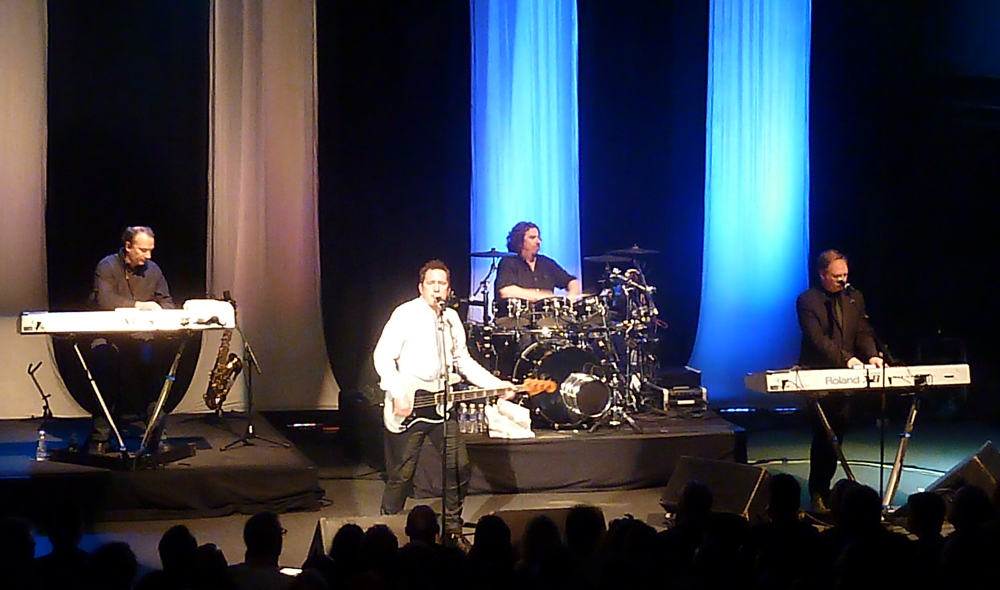
I love them all so I was just getting into the moment but I didn’t really notice. I thought surprisingly NY was one of the, at least from where I was standing, maybe it was different for you guys but where I was standing the crowd was not…
That’s NY.
Yeah, but I noticed like ‘New Holy Ground’ didn’t go over so well. I didn’t see anything in Toronto that stuck out as not so great.
Well we got offered Terminal 5 again and we chose not to play it. That’s why we’re doing the two Irving Plaza smaller venues.
I was going to say, it looks smaller than Terminal 5.
Oh it is much smaller, it’s like less than half the size. But also it’s safe. We didn’t want to take on Terminal 5 and not sell it out this time.
Yeah cause if you have a smaller one that you don’t sell out, at least you can’t really tell if there’s just like a section in the back.
That’s one of the good things about standing venues. If you get 50 or 60% sometimes still looks full cause people just spread out a bit more. (laughs)
Well, and how far can you see out? I mean with the lights and stuff.
It’s totally dependent upon the venue. Usually depends on if there is a spotlight. If the spotlight is low… if the spotlight is low I’m blinded… it’s like oncoming headlights on a car.
When we were at Covenant he kept asking the guy to turn the lights down. Have you ever had to do that?
No… I mean I’ve sometimes asked Andrew Little to turn the lights up on the audience so I can see them. We can see the audience from time to time but generally you tend to find that it’s only the first few rows you can see clearly all the time and the rest of the time you can’t see past sort of the fourth or fifth row, you’ve just got a light in your eye and it’s dark out there.
I was reading an article and they had asked if you had any regrets in your career and you mentioned Dazzle Ships as a possible one. So I’m just curious, if you could go back and do it differently would you?
No I wouldn’t do Dazzle Ships differently actually. I think we had to do it.
Yeah, I was thinking maybe it helped you get where you are.
I would probably do Crush and Pacific Age differently. I think in particular Pacific Age. There’s tracks on there that had we had more time, we would have had better ones. And Liberator as well. I kind of messed up Liberator. And it’s simple, you know, it always comes down to the same problem, not giving ourselves enough time to get it right.
Dazzle Ships you had a lot of time though, was it more you were experimenting?
Dazzle Ships was just a bit of a block really. You have to understand that we, as kids… music had become like our be all and end all. It was like our holy grail and somehow we had it fixed in our heads that we were going to change the world with our music. Now, in hindsight, quite how we were going to change the world I don’t know but it was that important anyway.
So when you find that you’ve sold millions of records and you’ve done everything you’ve wanted, you suddenly realize that, well…. you know what…. it’s one of those things like sometimes when your dreams come true you turn around and go “OK well, that hasn’t transposed my life. I don’t feel suddenly better or different so…”. All of your preconceptions that you’d created for yourself are sort of thrown on the floor and you’ve got to pick them all up and rebuild your whole mental framework again. And that’s kind of what happened with Architecture & Morality. Strangely, the success of Architecture & Morality detonated certainly my mental frame work. And we were ABSOLUTELY adamant we weren’t going to do Architecture & Morality Part II.
Which would make sense, you wouldn’t want to.
The record company would have liked us to have carried on doing that.
Well, yeah, of course they would.
But, yeah, we struggled to get a grip on what we should do with DS and that’s probably why it was a lot more overtly political, it was a lot more stripped down. I was talking to Malcolm last night about the new album and he was really excited about some of the ideas but he’s like “yeah but you know, you don’t want to do what you did on Dazzle Ships and just leave it like all the bare bones”.
And I think Dazzle Ships.. I mean, I heard it when in America Crush and Pacific Age were big cause it took us forever, it took 5 years to find it because we couldn’t find your stuff. So I remember popping it on and it started and I was like “…what language is that? What is that?” and then it went to ‘Genetic Engineering’ which I’d already known and then it went into ‘ABC Auto-Industry’ and I’m like “what the?” and it was like this ping pong, but I loved it. I thought it was one of the most creative, imaginative….and for me to hear it when you guys were “mainstream” I think is probably just as stark as someone else hearing it for the first time after Architecture & Morality which I hadn’t even heard at that point.
It’s interesting though. You have to put a little bit of energy into digesting Dazzle Ships I think if you’re not used to it. But subsequently, if you sort of had gone into Crush and Pacific Age and then you went back to discover Architecture & Morality, there’s some pretty weird shit on that album as well. I mean apart from the three singles and ‘She’s Leaving’, the rest of it is quite….odd.
And that’s how I saw Dazzle Ships. You’ve got ‘Telegraph’, ‘Genetic Engineering’ but then you have all these weird things but they were different. The ideas that you…I mean did you…
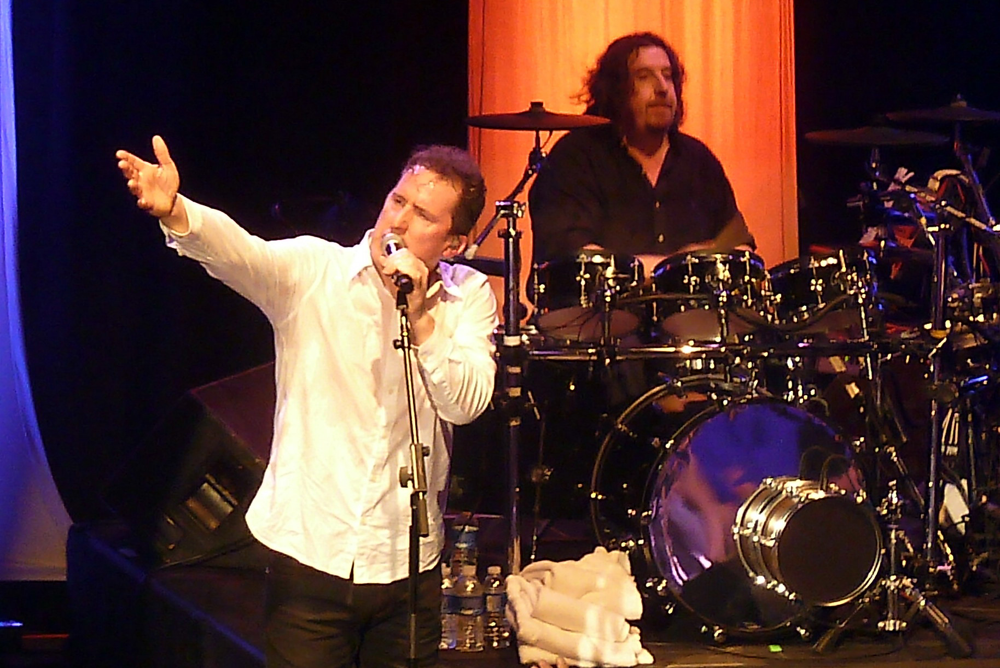
Well I’m very pleased with those ideas. It might have been a bit of a career wrecker at the time, but in hindsight you listen to it now and it’s coming up not far off 30 years old now. You listen to it now and you think it STILL sounds quite radical. The same way that I was listening to Radio-Activity by Kraftwerk the other day and I was thinking “This stuff would still be experimental. This stuff would still make people scratch their heads” but it’s wonderful. But anyways, we’ve got a load of interesting, new, inspirational music that we’re digesting.
Yes! I was going to talk to you about that.
I’ve only skimmed the surface with the stuff I’ve put up on the website to listen to. There’s a whole new load of stuff in there that is going to freak people out.
You mean your playlist?
yeah, yeah.
OK, I saw the goth/industrial and I just didn’t have time to comment but when I saw that I was like “Wow, I’m proud of you. You go Mr. M. that’s awesome!” You’re branching out, that’s good.
Our mantra for English Electric is quite simple… it’s what does the future sound like? It’s one thing to do History Of Modern where we relied on our own sound and our own history and we just modernized our own sound for the new millennium. The songs were great songs but we have this constant nagging dilemma…we were a band that was trying to be the future. That was part of our ethos, that was part of our appeal to a lot of people when they first got interested. They were great tunes. They liked the lyrics, they liked the melodies.. they liked some of the melancholy emotion in the lyrics and everything, but they also liked the fact that we were quite challenging and it was kind of like pushing the envelope. And THAT still remains an issue for us, that we feel like we should be trying to do that. And there’s been sections of our career where maybe we lost the plot and we weren’t, but now we can clearly see what’s going on. That we have this need to try to do something that is, if we can, going to go forward.
But we’re not going to do something that’s just experimental for it’s own sake. This is something that we definitely feel now that we’ve grown up is that there’s no point of doing something that’s just “Here’s an idea, what do you think?”. lt’s like, OK I’ve got the idea and now it sounds shit so I’m not going to listen to it more than once. That’s one of the dilemmas with experimental music is that if it’s just a theory expressed as a piece of music then it doesn’t bear repeated listening because you don’t get anything from it other than just the conception, sort of a theme. So it’s important to TRY to push, but to do it in a way that is essentially musical, that bears repetition, that has a lyric or a melody or something that you want to hear again. That’s why I think English Electric is going to take a little bit of time. Because there will probably be a lot of experiments that go “OK well that works but it’s not working with this piece of music, we don’t want to listen to that again”. So it’s just trying to pull in all of this kind of gothic and industrial and even MORE than that. Have you heard of a style of music called Glitch? This is really going to be the basis of the next album. Essentially, it’s music made out of pieces that are not musical basically. All the noises that used to be called interference or distortion or damage, people now make music out of these like clicks and bops and bangs and buzzes.
Is it from a certain part of the country? Is it European?
No, it’s a lot of German stuff so bands like Atom TM, Harmonic 313…. I actually put up a track I think by Harmonic 313 on my playlist. It’s taking that kind of rudimentary, simple building blocks, not in the same way that we tried to use synthesizers to not be traditional rock and roll instruments. Well synthesizers are now traditional instruments, and choirs and string pads. And so it’s ‘can we find a whole new palate to create a new sound?. It’s tightrope walking. It’s going to be a seriously difficult balancing act. But we have to try and do it.
So when you were finding these things that you were posting on the forum, were you literally just…. like sometimes I’ll type in something off of YouTube and then on the side it’ll give you all these different…
It’s exactly how you do it. You’re just following the lead. And then you end up on this safari where you’ve come fifty clicks away from where you started.
(laughs) you’ve forgotten where you started.
How did I end up here, you know? And it’s the same on iTunes as well… people who’ve bought this bought that so you just keep clicking and a new list comes up, a new list comes up and you just find things. I mean that’s a classic example of how the internet is a remarkable kind of learning tool. You don’t have to wait to read it or play it on the local station or somebody recommends it to you. Or going to the import store and pulling something out and going “I’ve never heard of this but I like the cover. I wonder what it sounds like” which I’m sure you’ve done before (laughs).
Or like “That looks good and it’s only $2. Yup, I’ve got it”.
Yeah so that’s a whole new way of discovering things.
All photos by Lori Tarchala.

